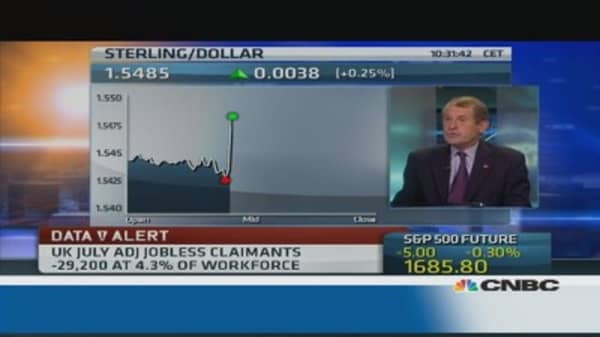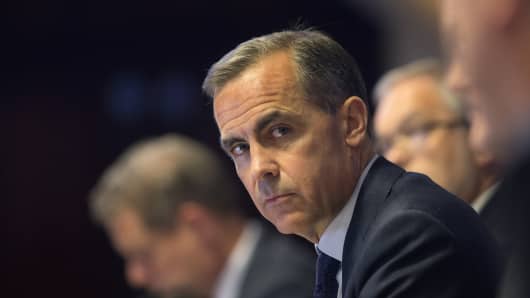The Bank of England's (BoE) Monetary Policy Committee was divided over plans to tie Britain's unemployment level to the central bank's ultra-loose monetary policies, minutes of its last meeting revealed on Wednesday.
The minutes came as official numbers showed U.K. unemployment remained at 7.8 percent in the second quarter; these statistics have taken on a new significance after Carney announced that interest rates would not be increased until unemployment falls to 7 percent or lower.
(Read more: Gloomy prospects for UK youths who've never held jobs: report)
External MPC member Martin Weale was the only member to dissent over forward guidance. "One member of the Committee (Martin Weale), while supportive of the adoption of forward guidance, voted against the proposition, in order to register his preference for a time horizon for the first inflation knockout that was shorter than proposed," the minutes said.
Sterling rose to $1.5491 from $1.5445 on Wednesday following the news, and gilt yields hit a new two-year high of 2.63 percent. This reaction implies the market is pricing in early interest rate rises, despite BoE guidance that rates will not rise until at least early 2016.
"With gilt yields rising further after this release (after steady increases yesterday), the MPC may have to take further action to head off what it has termed the 'unwarranted' rise in market rate expectations," said Capital Economics in research note.
At the news conference accompanying last week's BoE inflation report, Carney said the MPC does not expect unemployment to fall to the key 7 percent level for another three years.
However, Carney also outlined three caveats — known as "knockouts" — which would allow for any earlier rates hike. These were above-target inflation, unanchored medium-term inflation expectations, and any threat to financial stability. In addition, the BoE's new unemployment target could be met ahead of forecasts, allowing for an earlier rate hike than 2016.
(Read more: Fed vs BoE: Contrast in policy could hit pound)
'Interesting' vote
Geoffrey Dicks, chief U.K. economist at Novus Capital Markets, told CNBC it was significant that Martin Weale had "stood out against" Mark Carney.
"This vote is very interesting – clearly with the unemployment threshold set fairly high and the three knockouts… it looked as if the Governor would have got everyone on side," Dicks said.
"I think he's [Carney] been able to convince the doves that forward guidance is in some sense a substitute – at least in the short-term - for QE [quantitative easing]. But the fact that Martin Weale is saying: 'I don't want forward guidance in this form anyway,' is a stumbling block for Mark Carney."
The minutes also revealed that for the second month in a row, all members of the MPC voted against increasing the monthly asset-buying program this month. Prior to Carney's installment, some members had voted in favor of restarting the the £375 billion ($571.6 billion) stimulus program.
Strengthening jobs market
Britain's Office for National Statistics said on Wednesday that the number of people out of work fell by 4,000 to 2.51 million in the second quarter. The data also revealed a sharp fall in jobless benefit claims in July, boosting hopes of a strengthening labor market.
(Read more: Why UK jobs data will cast 'unprecedented' focus on Carney)
"This is a broadly encouraging set of data overall, indicating that the labor market is increasingly benefiting from markedly improved economic activity and strengthening business confidence. Record high and rising employment in turn is supportive to growth prospects over the second half of the year," said Howard Archer, chief U.K. economist at IHS Global Insight.
"We expect unemployment to head down gradually over the coming months, but the decline may well be limited by rising productivity (as a number of companies make more use of under-utilized workers they have been holding on to), and by an increasing workforce, as some previously discouraged workers return to the jobs market."
Alex Edwards, head of the corporate desk at UKForex, added: "The job market is showing signs of improvement, leading markets to suspect Carney may come under pressure sooner than initially thought to raise the U.K. base rate."
—By CNBC's Katrina Bishop. Follow her on Twitter @KatrinaBishop





